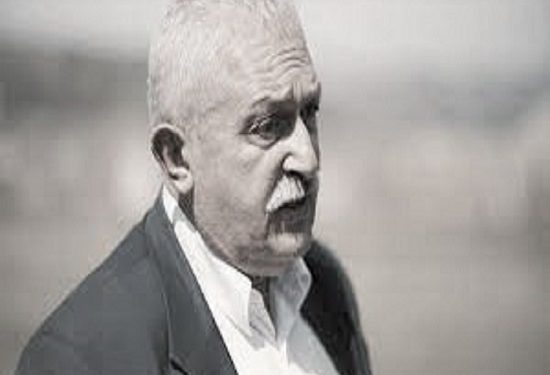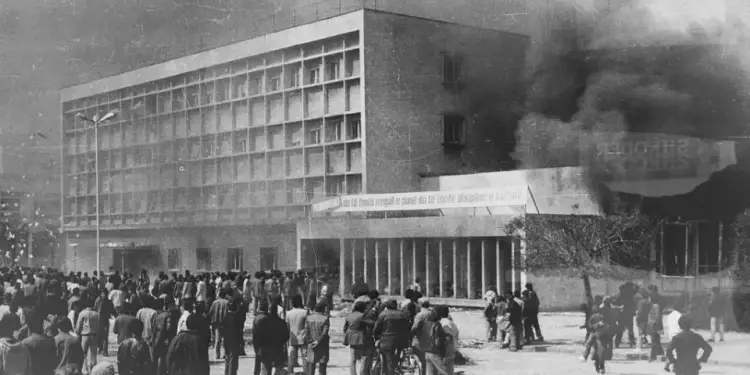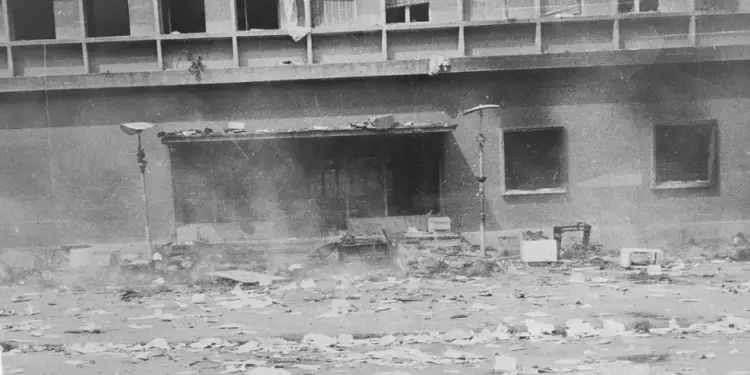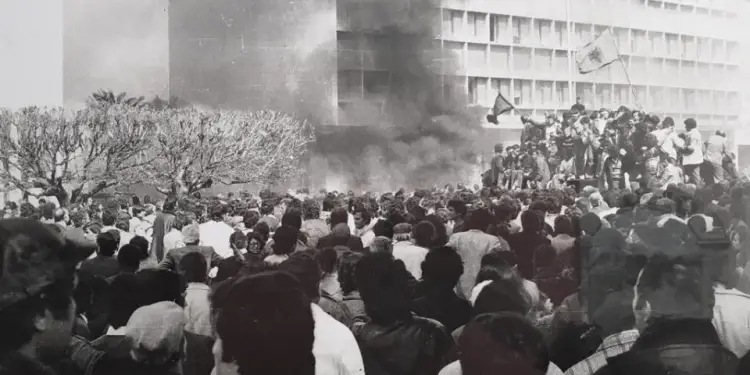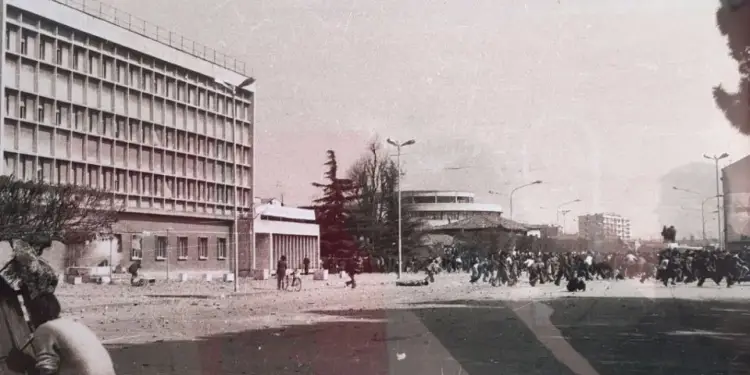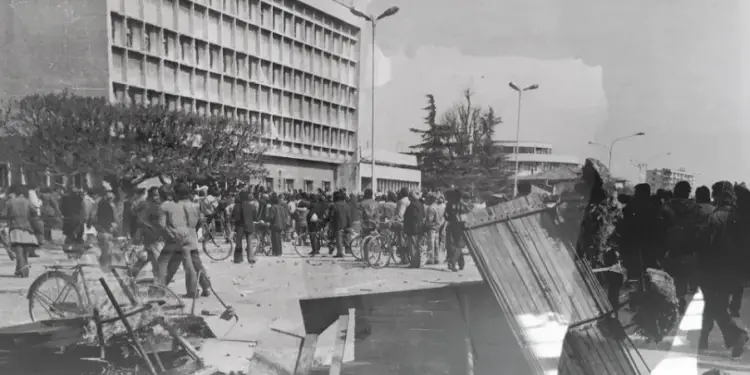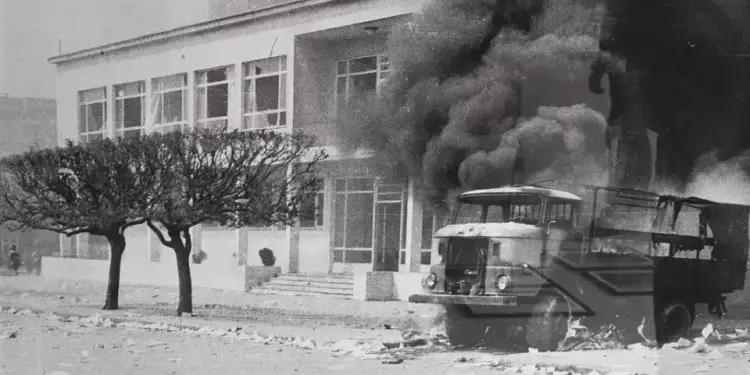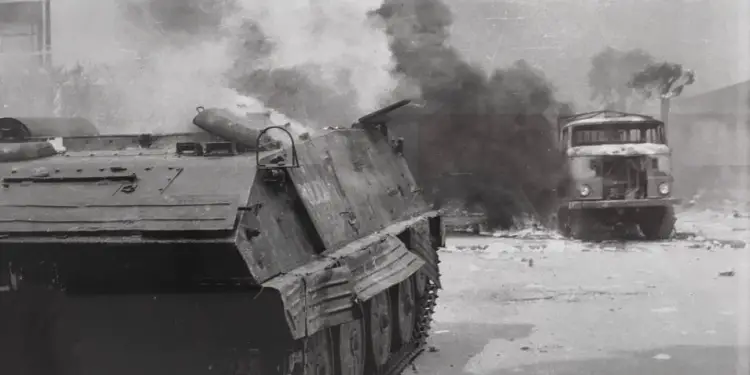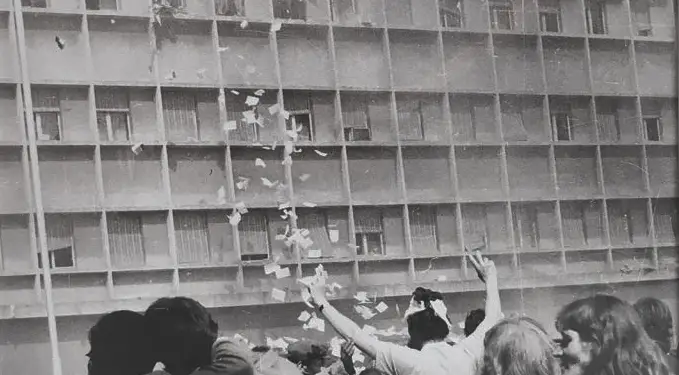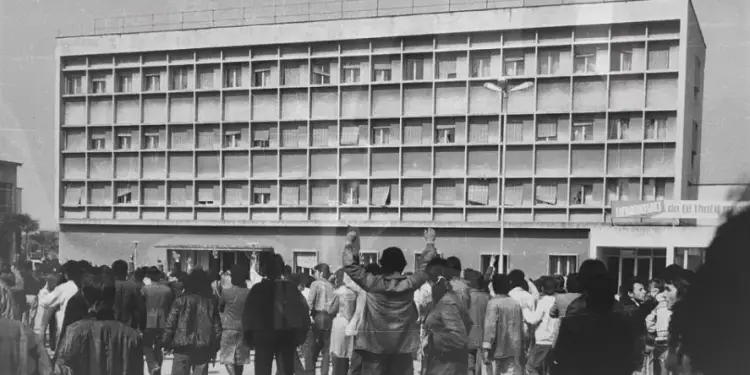By Marcel Hila
-Reflection about the historical date April 2, 1991 –
Why did it happen?
Memorie.al/ The genius philosopher Nikolai Berdiayev – expelled in 1920 from Soviet Russia as unacceptable by the communist regime in Moscow – is very correct when he says that “The nation is not the living population that lives at the current historical moment on the surface of the country and as the civil status register proves, but the nation is like a tree: with roots, a trunk and branches. The roots are the history embedded deep in time, which feed the trunk; the trunk is the nation with people, vitality, life and history, which develops and bears fruit in branches, in culture, identity, and works”!
And since we are here, I am saying in passing that this very concept is one of the basic principles of conservatism. It is said that even the dead are part of society, because they spoke, left their mark, they are mouths that inspire the life of a country’s society years and years later, yesterday and today.
But history is full of cases when nations suffer from lack of freedom, from war, oppression, violence and injustice. And just as the organism reacts when something hurts it, so does the nation. He stores everything in his memory, the pains that the injustices caused him, he keeps in his memory. Then, the trunk emits alarm signals. This huge measure calls on the roots, the storehouse of memory, to find, together with the branches, the strength for resistance, which is the right and moral reaction.
Due to violence and injustice, the branches no longer bear fruit; the social body languishes and dries up. Risks death. This is the law. Then the most positive forces, representative of the soul of the nation, are set in motion, organized, react. They want to bring life to the mass, normality; they want to close the wounds. Solzhenitsyn would say that they use the reaction. What is this? Re-action: to turn the action back, to give a hand to the justice that has been violated and fallen down and get it back on its feet.
If we were to apply this idea to our country, and specifically to the social community of Shkodra, formed in time, with values and history, it turns out that during the period of great suffering, many branches were cut off, the trunk was hit hard. His freedom was violated, his rights were violated. Without falling into repetition and without wanting to say things that everyone already knows, the large number of those shot, unjustly imprisoned for long years, interned, expropriated families and seized assets, violations that continued in sophisticated ways, of continuous harassment, controls, surveillance.
The reaction had started in the early days of the communist installation. It started with uprisings, such as that of Prek Cali, Llesh Marashi and Postrriba. The opposition of the regime with those who operated the mountains followed. There were many victims. There followed the reaction of organized groups of young people, which in Shkodër were numerous and numerous in members. The distribution of tracts and escapes never stopped. The agitation and propaganda never stopped. All these different forms of opposition to what tyranny was doing.
The battle moved from the mountains to the family. It became the school that produced the staunch anti-communist, the opposite creature to the ‘new man’ of the party. This was the rebel who rejected the regime, its work, the temptations, the threat and the career it offered, the joys it proposed. Like a factory, the anti-communist family, with generations and decades, created this individual. Without hesitation, happily, she brought to light the hope of this country, the man of the new time, that of freedom, who would definitely come and not miss the meeting.
The family became the secret seat of learning where the child was vaccinated to be protected from the plague. Subject? Rescue from communist infection. Because the family, full of wisdom and tradition, was waiting for the light clock to strike. When she came, the son of the house had to emerge unscathed from the tragic time. He had to be worthy of that moment. What was he supposed to do? A few things: rebellion against the teachings of the party, rejection of its lies, rejection of all false illusions, opposition to vain hopes, disregard of the poisonous utopia.
The family knew no elaborate arguments, but insisted that its creature categorically reject any tempting offer and not yields to any threats. She wanted a child who was smart but also brave inside. Big challenge. I say he succeeded. Albania owes its survival precisely to the anti-communist family. If this far-sighted hearth had not existed, the times of freedom, when they came, they would not have found the free spirit waiting for them, they would not have accepted them, as it happens today somewhere in our country. Freedom would have been too late to make a stand between us. Our gratitude goes to this family.
But we also have the small social group, its derivative, friends, relatives, confidants. Ideas were exchanged there. In the absence of the right to organize, of political parties, these two elements created the culture of resistance and was the most unique opposition in the world. One thing was known for sure: in this city lives an unsubdued people, who, due to the circumstances, cannot react and is not publicly declared an opponent of the regime, but if the day comes, if the sign is given, if time calls, a great army is formed here.
This particular community of the city – the anti-communists – records the injustices in memory, files them in the memory shelves: everyone has family and personal history. These they mutually share with friends and create the great story of pain; and like the streams that come together and go to the sea, these stories form the great flow of suffering of the Albanian people. The individual of this time was an opponent and reminder. Nothing of the great wealth of suffering was lost. This is our anti-communist culture, a great treasure, which I am afraid we are not aware of. We should be proud and consider it as the most precious fruit of the trunk of our community.
It is about thousands of people of this type. Even children, who in kindergarten unwittingly reveal family secrets, without remembering the consequences: they curse Enver when they see his portrait. There are young people of different ages, teenagers, adults: whole generations together, all steadfast in their hearts against communism. Shkodra deserves to be considered the ‘Polar Star’ of our country, as Hygoi says: ‘The smoke of Paris is the thoughts of the universe, while we must say that the thoughts of Shkodra are the lights of Albania.
On April 2, all this measure came into effect. It was the first political resistance. Suffering called crime to account. The roots moved the trunk. The branches were weaving the fruits of a new age.
Another big disappointment, regardless…!
But communism had created our opposite, the individual who did not want change. We did not think that ‘homo communist’s’ created its own man, many in number. In fact, he had time, power, and opportunity. They had the most important thing: the raw material, ignorance. They had managed to form the type that fed on terror and lies that loved life in poverty, crime, and deception. Terri hates the light. It makes war on her. The communist victory in the elections of March 31, 1991 is called the triumph of ignorance and crime.
We remembered that the people would choose the freedom offered would rebel against evil. The big cities, the main ones, seized the moment: all, without exception, chose freedom. But the large part, the backward mass, did not want it, rejected it. Fate extended her hand, but the nameless crowd spat on that hand. Ungrateful, this anonymous mass chose to vote against themselves and unfortunately against others!
The regime, which had suffered many internal blows from the revolts of freedom-lovers and was isolated to the point of complete boycott by the world, felt great joy: it learned that the population it had enslaved refused freedom. The slave wanted the slave owner back. The tyrants, with vile excitement, did not want to inform the people about the victory of Democracy in Shkodër and the surrounding areas. Satisfied that change did not come, they struck with the diabolical weapon of silence. ‘Don’t expect good news from us!’.
Then the army of anti-communists, big and small, did what it had never done before: it decided to demand an account. He went to the criminals at the door. He showed him that he was no longer afraid, that time was with them, that the light had come and the time of terror was over. There is joy in this action, there is bravery, optimism. They said: You have deceived and manipulated us enough! All square! Let’s say this together!
What happened…?!
On April 2, two days after the elections had been held and no results had been made public, large masses of people, without being notified by radio, television, telephone or any of the means available to us today, driven by a simultaneous internal impulse, rushed to the square in front of the former Party Committee, the nursery of crimes and the hideout where our misfortune was hatched for a long time. Crowds flocked from all sides: from ‘Parruca’ and ‘Xhabijet’, ‘Perashi’ and ‘Skenderbeg’ neighborhood, from ‘Serreqi’ and ‘Arra e Madhe’, Pazari and the Stadium area, from ‘Kirasi’ and ‘Dudasi’ , ‘Ndocajt’ and ‘Ballabanja’. The square was filled with young people from the Institute, from gymnasiums, from adults and old people who had left their homes and jobs.
And to prove the word that the generations of the family were there and not only the youth, I remember two people I knew: Ahmet Bushati, a former political prisoner, together with his high school student son, Kreshnik, who was hanging out with his high school student protesting friends as and Matish Çefën, also a former political prisoner, together with his son, Teo, with his classmates. Both of them were prison mates, their sons were high school mates, today they are protest mates. It was tradition in action. I am completely sure that there are many, many others like these two fathers, with their sons and daughters, but I don’t remember them and I didn’t know them.
Then, what we all know happened. The peaceful calls of the unarmed demonstrators, who only wanted the results of the elections to be known, were answered by the policemen present in the former Committee building with bullets from combat weapons. Four dead and ninety-six wounded. I saw with my own eyes bloodied young men who fell on the square. Bullets had pierced his side and beyond.
I remember the daughter of the great artist Gjok Vata. She did a heroic act: she jumped on the tank that the Internal Affairs Branch had brought to terrorize the people. Her figure surpasses the trumpeted heroes: She did not attack to kill; she invited her Albanian brothers inside the diagaç so that they would not kill the other brothers who aspire to freedom. Her monument is missing from the square.
The victims and the injured were taken to the hospital…!
A little later, young men were seen coming with the bodies of the slain in their arms. The bearers were covered in blood for themselves. An unimaginable sight unfolded: heroism, unseen until that day, showed that freedom had remained suppressed, but not dead. Tragedy brought to light the life within these souls. The shooting continued. The wounded were increasing. For the castle to be built the sacrifice of Rozafa was needed; for freedom to come, the sacrifice of these martyrs was needed.
Shkodra had the opportunity to donate four more lives to the altar of freedom, saying that the extremely large number of those during the time of great suffering was not enough. These martyrs would go themselves, before the Lord of Heaven, and would ask Him for the much-desired freedom of their people, so that the suffering would end. They were the representatives and ambassadors of the pain of this land. They were going before the Most High Throne and with the sacrifice of their lives they said: ‘Make the evil end!’.
That’s how it should have happened. Because after a year it was seen that their prayer, united with that of all the many martyrs of this land, was taken into account.
Honor forever to these mediators. Albania will be, for centuries, grateful to their sacrifice. Memorie.al




